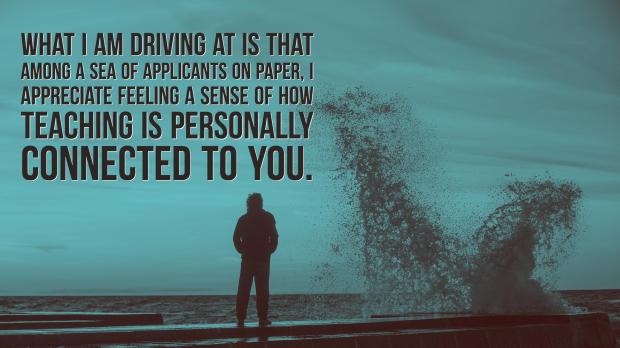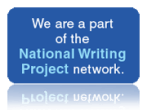From the Classroom: Advice on Landing a Teaching Position
by Brian Kelley
Since we write blog posts From the Classroom, I am writing to education students or recent graduates about how to join us inside the classroom. While every school building will have its own unique criteria for prospective candidates to interview, I thought I might be of some service to English teachers seeking a position. I have been involved in the hiring process during several occasions throughout my career–twice for assistant principals, three times for teaching positions.
Recently, I was asked to consider 100 applicants for an ELA position and to pull a very small sample for screening interviews. Several colleagues also went through this exercise.
First, I did not expect to feel a grave responsibility–but I did. Sure, I wanted to respect our kids, staff, and community, but I felt an overwhelming responsibility to read and think through each application in order to honor each applicant. The decisions I made (yes/no) impacted one hundred people. Ultimately, my decisions would contribute to someone starting or continuing their career.
I read everything in each applicant’s file three times: cover letter, resume, essays, letters of recommendation, and anything extra included with the submission. I took notes. I even did a cursory Google search to see if I could find online portfolios or a professional footprint. Those who included a link to a digital portfolio on their resume–very helpful! Afterward, I compared notes with a colleague to make sure I didn’t miss something or misread something. In case you are wondering, writing samples on applications helped tremendously.
My gosh, the first consideration (remember this is an ELA position) is can they write? Which other subject area allows for a natural demonstration of abilities in the subject area that you wish to teach? Do we ask physical education teachers to dribble a basketball? Do we ask math candidates to solve for x and y? Do we ask science teachers to dissect a worm or a music teacher to play the recorder? No. We don’t ask French teachers to speak French in an interview! But we ask every candidate to write–to express their thinking. And if you want to teach writing, take your time and make it the best piece of writing that you can–it matters. You have an opportunity that other teaching candidates do not.
While a professional digital footprint is not a make-or-break element, it helps. I am surprised at how difficult it is to find anything online about most applicants. On the one hand, I respect the right to privacy, but on the other hand, much is being written and explored about a teacher’s role in modelling positive digital citizenship. Again, not a must-have for me as I read through applications, but at the very least I look for it.
Three distinct elements trigger my pulling a resume for a face-to-face screening interview for a English position: passion, modeling, and engaging as a professional (workshops, conferences, memberships, journals).
I want to gather a sense that candidates have a passion for reading and writing. I want to know that you read for pleasure and for professional growth. I want to know that you write–at the very least that you write and model for your students. I can not underscore this detail enough. If you want to be in an ELA classroom, and you want to land the job over the competition, being a model (and living that life) is the first place to start. It will absolutely separate you from the slush pile.
 And, by the way, easily searchable links on Twitter to blog posts or YouTube videos or infographics or art–anything that you create yourself–would help prospective employers see that you value reading and writing…in addition to demonstrating your willingness to explore the impact of digital spaces. I understand there is a fine line to walk considering your privacy–but you do want to teach, yes? Many people hide their profiles from being searchable for many reasons. When I can not find a candidate online, do you know what I think (fair or not): do they have something to hide, or do they not engage in digital literacy?
And, by the way, easily searchable links on Twitter to blog posts or YouTube videos or infographics or art–anything that you create yourself–would help prospective employers see that you value reading and writing…in addition to demonstrating your willingness to explore the impact of digital spaces. I understand there is a fine line to walk considering your privacy–but you do want to teach, yes? Many people hide their profiles from being searchable for many reasons. When I can not find a candidate online, do you know what I think (fair or not): do they have something to hide, or do they not engage in digital literacy?
Digital literacy is a very real concern K-12. Education is already spending millions of dollars training teachers to keep up with the digital explosion. You add value to your name if you demonstrate a background in digital literacy. And it can be as simple as you write and read and engage (even to a small degree) professionally online.
Quick example: I met a West Chester University graduate at PAWLP’s spring workshop: Amanda Reichert. She did not have a full-time position, but she was there. She had a business card with a link to her professional portfolio. She keeps an active Twitter account of herself as a professional: @AmandaJeane2. I immediately went back to my building and told my principal–we should talk to this kid. Now, it did not pan out because she did not have the certification for middle school, but because I immediately understood how teaching connects to her personally, I felt as though I wanted to know more. Amanda opened a door for herself. By the way, if Amanda gets her certs and still needs a job, I would absolutely pull her name in the future because I got to know her–she showed up. Amanda was at a workshop and she is doing the other positive things as well. If any administrators read this and want to reach out to me about Amanda (bjk925@gmail.com)–I’m confident that you would be impressed. Or you can connect with her yourself through social media.
Imagine for a moment that you decided that you wanted to start taking guitar lessons and you searched online for instructors. Three instructors come up with websites in the your area, but only one has video and audio of their playing. The same not only keeps a professional website of their philosophy and samples of their teaching style and influences, but also shares slices of their music life (playing and teaching) on social media. They include pictures of their studio and students working side by side with them. They even write a weekly blog post about music. Would you choose one of the other two or would you choose the one you understood (their passion and their modeling) a bit better through their digital footprint? Where would you spend your money?
What I am driving at is that among a sea of applicants on paper, I appreciate feeling a sense of how teaching is personally connected to you. Generic statements on the value of positive discipline or reaching every learner did not grab my attention as much as the personalized statements or anyone who has shown a willingness to engage digitally as a learner.
One final thought, depending on what level of building you are applying for, craft your writing towards that audience. A generic letter meant to cover both middle school and high school might not be noticed as much. Listen, a candidate might be a great teacher, but it is very challenging to make that connection if the writing does not lead us to who you are. A generic cover letter or a generic essay for the district gets lost in the pile. The needs of a middle school school student are different from the needs from a high school student–giving your prospective employer the confidence that you understand that point also matters.
In the end, after going through 100 candidates on paper, there is only one job to offer. One person exhales, and 99 others wonder what went wrong. I don’t envy you or the competition. But just know that what you place on your application matters. There are many teachers out here involved in the hiring process–and we have compassion for what you are going through. We read what you write. We want to know you as best we can from a piece of paper. We want the best for our kids, of course, but we also want the best for our profession. This is a beautiful profession, a powerful profession. We want you to be a part of it, and we want you bring your unique talent and vision to the staff.
Write it. Share it. Connect it.
 Brian Kelley teaches 8th-grade creative writing at Charles F. Patton Middle School in Kennett Square, Pennsylvania. You can email him at bjk925@gmail.com, connect with him on Twitter @_briank_ , or follow his podcast The Classroom (on iTunes) or his blog: http://www.brianjkelley.net/
Brian Kelley teaches 8th-grade creative writing at Charles F. Patton Middle School in Kennett Square, Pennsylvania. You can email him at bjk925@gmail.com, connect with him on Twitter @_briank_ , or follow his podcast The Classroom (on iTunes) or his blog: http://www.brianjkelley.net/




Brian – thank you for this very thoughtful post and for the sound advice of publicly living the life we hope to inspire our students to live. This very topic of conversation came up in the Grammar Matters course today, but we only focused on the potential negative impressions perspective teachers’ online (Facebook, Twitter, etc.) lives could make. You make such great points about the need to advertise ourselves positively and the join the professional communities around us.
LikeLike